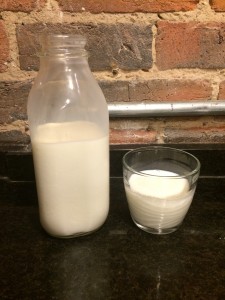IMMEDIATE RELEASE
May 16, 2024
www.nj.gov/agriculture
PO Box 330
Trenton, New Jersey 08625-0330
(TRENTON) – The New Jersey Department of Agriculture (NJDA) and the New Jersey Department of Health (NJDOH) are reminding residents of the risks associated with consuming raw milk amidst the current H5N1 Avian Influenza (Bird flu) outbreak, especially considering virus detections in dairy cows in some states. There have been no reports of H5N1 bird flu among residents and no detections in dairy cows in New Jersey.
Raw milk is milk from cows, sheep, and goats that has not been pasteurized. The U.S. Food and Drug Administration (FDA) reports no concerns about the safety of the commercial milk supply because products are pasteurized before entering the market. Pasteurization is the process of heating milk to a high temperature for a sufficient period of time to kill harmful germs. Raw milk and products made from raw milk, such as soft cheese, ice cream, and yogurt, can contain a variety of disease-causing germs that can cause serious illness, such as Brucella, Campylobacter, E. coli, Listeria and Salmonella.
“Healthy people of any age can get very sick after consuming raw milk or raw milk products; however, children younger than 5 years, adults over 65 years, and those with weakened immune systems are most at risk for severe illness,” said New Jersey Health Commissioner Dr. Kaitlan Baston. “Pasteurization is proven to be the best way to get rid of harmful pathogens in milk, including influenza.”
Feeding raw milk to pets can also make pets sick. Cats and dogs can get sick from bacteria that can be found in raw milk, such as Campylobacter and Salmonella, and there is increased concern about the potential risk of severe disease from H5N1 bird flu. On at least one farm impacted by H5N1 bird flu in Texas, there were reports of cats who died after consuming raw milk from sick cows.
“With the seriousness of potential consequences to pets that may result from pets consuming raw milk from H5N1 AI-infected cows, we strongly recommend consumers avoid handling or using raw milk,” New Jersey Secretary of Agriculture Ed Wengryn said. “The milk marketing system is such that milk moves around the country, and consumers should not assume raw milk being sold as pet food came from a farm free of the virus. We are fortunate that New Jersey has had no reported detections of H5N1 in dairy cattle. Because of the national marketing of milk, we will continue to be vigilant.”
Dairies are required to only send milk from healthy animals into processing for human consumption; milk from impacted animals is being diverted or destroyed so that it does not enter the human food supply.
The Centers for Disease Control and Prevention (CDC) recommends taking the following steps to reduce the risk of getting sick:
- Choose pasteurized milk and dairy products.
- Refrigerate milk, dairy products, and other perishable food at 40⁰F or colder.
- Throw away expired food, including milk and dairy products.
The NJDOH and NJDA are closely monitoring the evolving H5N1 bird flu situation and will continue to work with local, state, and federal partners to protect the health of people and animals in New Jersey.
Additional Resources can be found at:
CDC | H5N1 Bird flu: Current Situation Summary
CDC | Current H5N1 Bird flu Situation in Dairy Cows
FDA | Updates on Highly Pathogenic Avian Influenza
FDA | Questions and Answers Regarding Milk Safety During HPAI Outbreaks
CDC | Raw Milk Questions and Answers



